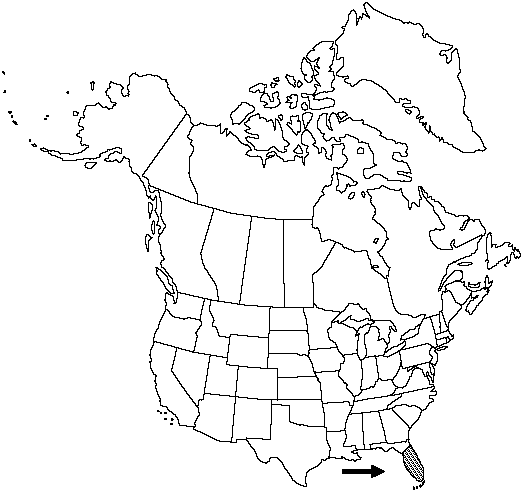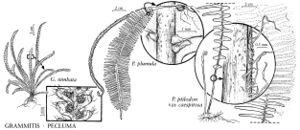Pecluma plumula
Amer. Fern J. 73: 115. 1983.
Common names: Plume polypody
Illustrated
Basionym: Polypodium plumula Humboldt & Bonpland ex Willdenow Sp. Pl. 5(1): 178. 1810
Treatment appears in FNA Volume 2.
Stems ca. 5 mm diam.; scales dark-brown, linear-lanceolate. Leaves pendent, sometimes erect in small plants. Petiole black, 1/10–1/5 length of blade, hairs few, unbranched; scales ovate to cordate, conspicuous, inflated. Blade linear-elliptic, 15–50 × 3–7 cm; base abruptly cuneate; apex tapering to acute. Segments linear, 1.5–2.5 mm wide, sparsely short-pubescent; segments at base of blade abruptly reduced to lobes, not deflexed. Veins 1-forked. Sori round; sporangia with 64 spores. 2n = 148.
Phenology: Sporulating all year.
Habitat: Epiphytic or occasionally on rock, wet woods, river banks, hammocks, and limesinks
Elevation: 0 m
Distribution
Loading map...

Fla., Mexico, West Indies, Central America, South America to s Brazil
Discussion
Selected References
None.
Lower Taxa
None.
"/10lengthofblade" is not declared as a valid unit of measurement for this property.
... more about "Pecluma plumula"
3-celled +
cuneate +
simple +
linear-elliptic +
absent +
Plume polypody +
green +
aboveground +
glabrous +
branched +
unbranched +
few +
Present +
absent +
decurrent +
narrow +
monomorphic +
crowded +
dimorphic +
erect;pendent +
narrowed +
circinate +
entire;entire +
absent +
articulate +
black +
round +
small +
Amer. Fern J. +
1983 +
pubescent;glabrous;pubescent;scaly +
not clathrate +
dark-brown +
attached +
conspicuous +
lacking +
spaced +
adnate +
not deflexed +
short-pubescent +
terminal +
round +
Illustrated +
monolete +
bilateral +
unbranched +
pruinose +
not whitish +
short-creeping +
long +
few;numerous +
granulate +
complex +
Pecluma plumula +
Pecluma +
species +
anastomosing +
free +
1-forked +
perennial +
terrestrial +
epiphytic +
